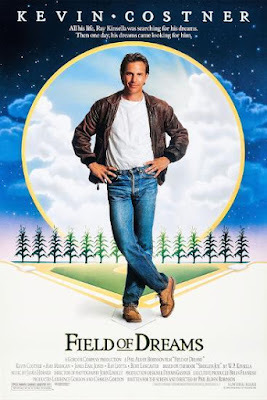“Field of Dreams”: If You Shoot It, Will They Come?

It’s hard to imagine how manytruly idiotic projects have been launched, over the years, based on a hit movie’spromise that “if you build it, they will come.” To be honest, 1989’s Fieldof Dreams doesn’t make a whole lot of sense. Just exactly WHY do the 1919Chicago White Sox, in perennial disgrace for their role in throwing that year’sWorld Series, emerge from an Iowa cornfield because a young farmer who missesthe Sixties has constructed a baseball field on his back forty? Why does this farmer idolize baseball, and long-agoWhite Sox batting champ Shoeless Shoe Jackson in particular, to the point thathe’ll jeopardize his family’s economic future by taking direction from amysterious voice? (And, come to think of it, why does his feisty wife put upwith her husband’s fiscal craziness even though they might well find themselveshomeless in future?)
But logic is not what Fieldof Dreams is all about. It’s about dreams, and in particular about the Americanmale’s dream of a father/son bond symbolized by the idea of tossing around abaseball with your dad on a warm summer’s day. The give-and-take implicit in a simplegame of catch seems to be craved by many men. At least, it is this element ofthe film’s climax that apparently turned many male moviegoers into emotionalpuddles when Field of Dreams screened in cineplexes across America in1989. The movie attracted critics as well as audiences. It was nominated forthree Academy Awards, including Best Picture and Best Adapted Screenplay; in2017 it was welcomed onto the National Film Registry.
Before I rewatched Fieldof Dreams this past week, I of course remembered primarily Kevin Costner asthe dreamy farmer with father issues and a great abiding love for America’sgame. And I fleetingly remembered Amy Madigan as Costner’s supportive wife aswell as Ray Liotta (always a distinctive actor) as the shadowy incarnation ofShoeless Joe. I did not recall Burt Lancaster in a small but key role asArchie “Moonlight” Graham, an actual long-ago outfielder who played only asingle game in the major leagues before attending medical school and embarkingon a long, distinguished stint as a smalltown doctor. Lancaster’s role, thelast of his stellar career, allows him to hint that there are other kinds ofglory than those found on a baseball diamond.
I also didn’t remember that Fieldof Dreams contains a major supporting role for James Earl Jones, thelegendary actor with the basso profundo voice who left us just a few weeks agoat the age of 93. Jones played Terence Mann, a successful novelist who foundfame in the Sixties, but now contends with small-minded readers who seek to banhis books. In the course of the film, Mann’s character is discovered to have asecret passion for baseball. Eventually he delivers a long, wonderful speechabout baseball and its connection with America past and present. In theup-and-down history of our nation, says he, “the one constant through all theyears has been baseball.” It is baseballthat signifies “all that once was good, and could be again.”
The extras that accompany theDVD of Field of Dreams contain many clips of the film’s actors,producers, and writer/director Phil Alden Robinson. Almost all of them talkabout their personal passion for baseball, and share memories of ballgamesplayed with their dads. Jones is the exception: he never played catch with hisabsentee father. Still, he considered baseball a key part of his DNA, and hisjoyous performance here proves it.
Beverly in Movieland
- Beverly Gray's profile
- 10 followers



